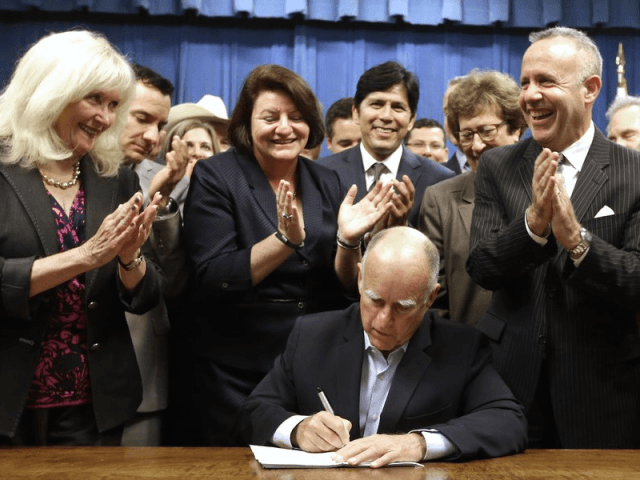California Gov. Jerry Brown has signed AB 1461, known as “Motor Voter on Steroids,” to join Oregon in automatically registering people to vote when they visit the Department of Motor Vehicles (DMV).
The legislation takes the federal “Motor Voter” law to new levels by dictating that once residents interact with the state DMV for a license or ID for the first time, or renew an existing license, they are deemed to be registered to vote.
Oregon passed a law in March that makes the registration provisional for 21 days, during which time applicants will be notified of their new status and be given a chance to become affiliated with a political party or to opt out of the voting process altogether.
But the legislation that the Democrat-controlled California legislature passed, and that Brown signed, calls for data collected by the DMV to be provided to the Secretary of State’s office, which would verify a resident’s legal eligibility to vote before registering them. Drivers would also have an option to opt out or cancel their voter registration.
One of the first moves of newly elected President Clinton in 1993 was to have his Democrat-controlled Congress pass the National Voter Registration Act, known as “Motor Voter,” which required motor vehicle departments, welfare offices, and other government agencies to provide forms and register voters. Motor Voter also made it illegal to check the IDs of applicants, and ordered states to allow registration by mail.
Motor Voter is credited with massively increasing fraudulent registrations, according to the Cato Institute. Cato documented that the number of registered voters in Philadelphia increased by 24 percent from 1995 to 2004, despite the city’s population falling 13 percent.
The Association of Community Organizations for Reform Now (ACORN), which had been connected to voter fraud in the past, was exposed in the aftermath of the 2008 elections by investigative reporters James O’Keefe and Hannah Giles. The duo secretly recorded videos of ACORN personnel across the United States expressing willingness to participate in what may have amounted to criminal behavior.
The organization suffered an immediate loss of funding from federal agencies with which it had contracts, and from private donors, after the ACORN videos shamed a Democrat-controlled Congress into cutting ties with it.
After that, Nevada’s Democratic attorney general and its Democratic Secretary of State teamed up to conduct a highly visible raid of the group’s Las Vegas offices.
According to a story by John Fund for the Wall Street Journal, after ACORN complained the raid was a “stunt” designed to hinder its efforts at minority registration, Larry Lomax, the Chief Elections Officer in Las Vegas, responded that the group’s claims that it had extensive quality controls procedures in place to catch fraudulent registrations were “pathetic.”
Lomax documented that ACORN had hired 59 inmates from a work-release program at a prison near Las Vegas to register voters. Some inmates who had been convicted of identity theft were promoted to supervisors. Fund said that local joked that “at least ACORN was hiring specialists to do their work.”
Democrats have ferociously attacked any anti-fraud proposals as violating voters’ constitutional civil rights. The party’s website staunchly opposes requiring voters to show identification, despite polls that show 82 percent of Americans think a photo ID should be presented in order to vote.
A total of 36 states have passed laws requiring voters to show some form of identification at the polls, but only 32 of these voter identification laws are in force. Laws in Arkansas, Missouri and Pennsylvania have been struck down by state courts, and North Carolina’s 2013 law does not go into effect until 2016.
The remaining 18 states, including California, use other methods to verify the identity of voters. Frequently, the only identifying information required is a signature at the polling place that is checked against information on file.

COMMENTS
Please let us know if you're having issues with commenting.